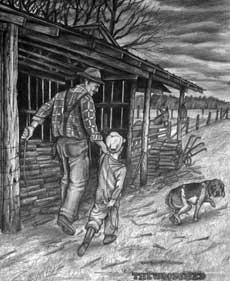journey post 24–Honest to God, part 2, Discovering the good father who is there
“It’s not what you look at that matters, it’s what you see.” —Thoreau
The voice in my head was a not-so-gentle urging: “Take another look, Donkey….” Donkey: my African name. A good Manjako family name. And a private joke between me and God.
“I don’t need to look at it—I know what the verse says, ‘My son, despise not the chastening of the Lord, for whom the Lord loves, he disciplines.’” I was ready for the woodshed because I had dared to dust off my doubts about God’s love and goodness. I knew the woodshed well. A 2×4 upside the head from God was standard-issue in my zigzag journey.
But this was no longer a joke. I had been watching good people go through great pain and suffering—it just never seemed to stop. One Christian friend had candidly shared: “God is out to get me.”
In the dark recesses of my own soul was a long-suppressed, haunting, but familiar question about evil, a question that wouldn’t go away. Why this suffering? So much pain … Can God truly be good and loving? A similar question arose when leaving Africa: did God dangle dreams in front of me just to take them away and show me my unworthiness?
Most of the time, like most people, I could find other things to think about. But now it wouldn’t stop: Did he care? About these people? About me? He seemed distant, like my own dad. “What do you really think of me, Lord? Do you really love me? I have to know! I can’t go on like this!”
I was determined to be honest with myself and with God, and not stop until I had an answer. I was back on that hospital bed in Vietnam. This time, it was not about the existence of God or Jesus, but about God’s character. My own self-esteem was mixed in somehow, but, fundamentally, at the heart of my question was, Who is this God? Is he really good? Was “Donkey” a joke between us or was it on me?
I had asked, but this verse about love and discipline was all I got. I opened the Bible, Proverbs 3:11, and read every word: “My son, do not despise the Lord’s discipline and do not resent his rebuke, because the Lord disciplines those he loves, as a father the son he delights in.”
I did a double-take: that last part, about fathers delighting in their sons…. My dad died when I was 13. I needed him more than tears could say. He left … or, God took him. Thinking of God as my “father” was irrelevant. I’m sure my dad loved me, in his own way, but he was never there for me. Love?
That last clause: God “as a father… delights.” Aside from the discipline part, the verse was saying that God, like any good father, seeks to do what’s best for his children simply because he delights in them: that’s the norm. God is, after all, the inventor of fatherhood and motherhood, and God is not like my dad. That’s not a slam on my dad: I needed to make that distinction explicit so I could see how I had become so locked into a dysfunctional understanding of God in his role as Father. The word “delight” gave substance to the nearly vacant meaning of “love.” “Delight” is a very human word, and it made “love” throb and glow with life and passion. I was literally dumbfounded: “Lord, you delight in me?”
“As a father delights ….” God delights in me. I, as a son, am the object of his delight….
I had expected the woodshed 2×4 reinforcing my donkeyness. God came instead in grace, gently opening my eyes so I could see that there was something I had missed ever so long.
I’ve written before about this “bookend” to my zigzag journey, the day I discovered the delight of God in—dare I say it?—the Donkey. I rediscovered adoption and the key to seeing the heart of God. You’re thinking, “I know this … Walt’s rehashing an old story.” That is precisely not so, because that day I began to understand God’s father heart, which became the key to unlocking an answer to our question.
I discovered how little I knew this one I routinely called “Father”: that was just a title. I could cite chapter and verse for all the things I knew about him. But the point was not to reconcile facts on file about God with the painful reality of a world filled with evil. My desperation led to determination to know him as completely as possible. I had to see his heart and know his character. But how? Looking back at how that unfolded made me realize that there now has to be a Part Three to this.
Knowing anyone, especially their character, involves a relationship over time. The Scriptures tell us about God’s character, but knowing him requires time and the Spirit to make it real. We know our parents not because of a book on “parentology,” but because we lived with them and watched them and so we know them and their heart. Knowing our friends involved a similar process.
It’s the same with God. Someone may come to saving faith, get their ticket to heaven, their fire insurance paid up against the judgment day. But knowing him doesn’t come in one moment. Eternal life is given, as Jesus prayed (John 17), “that they might know you, the only true God, and Jesus Christ.”
I have several theology books. They reflect developed, logical, scholarly, even elegantly-constructed systems produced by humble men. The systems differ widely, though based on the same Bible and are therefore “biblical.” Each is written by men who see all through the filter of human fallibility. And not one of them addresses the role of God as Father. They are like those multiple frag wounds I received in Vietnam: they don’t penetrate the vital organ, the father heart of God. Yet Jesus spoke of little else.
Jesus taught those who would be his apprentices to live their lives each day as him living it, to see life from the Father’s perspective, and so to live it with his agenda in view. He portrayed God as analogous to an earthly father and mother who take care of, provide for, who teach, train, and protect a family. He taught them to give up their “small ambitions” and trust their “Abba,” a term akin to English “Papa.”
I don’t know everything about God; I can say that I know him–because he answered my call, Donkey that I am. The name was no joke on me, after all. Yesterday was Palm Sunday, the day Jesus entered Jerusalem on his way to the cross. Every Gospel account reminds me: he chose to enter on a donkey….
Next: Part 3: Knowing his Father heart answers the quandary of a good God and an evil world. And just how is that?





